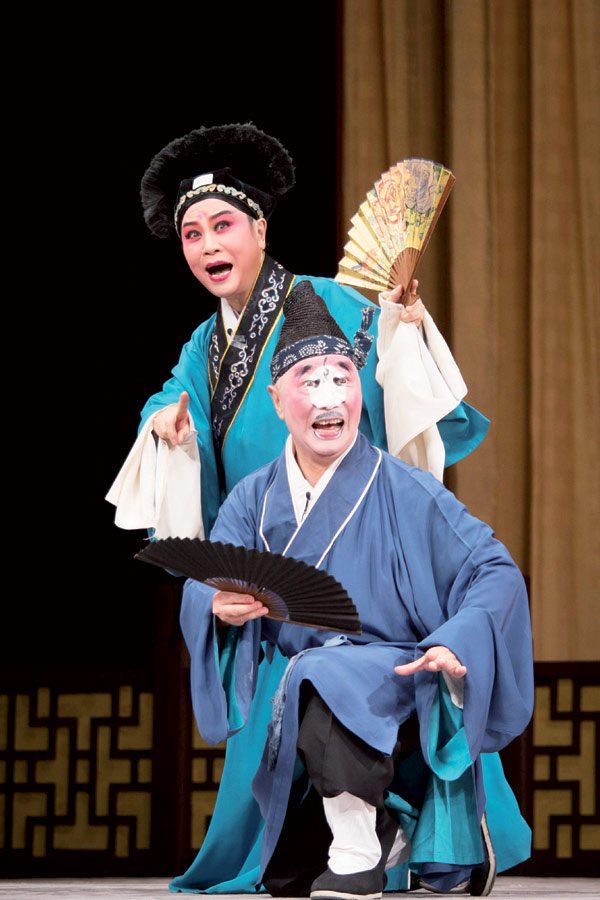Kunqu Opera's great survivor
Updated: 2013-05-02 05:01
By Zhang Kun (China Daily)
|
|||||||||||
|
 Yue Meiti (top), 72, plays a young male role in a Kunqu Opera performance. Provided to China Daily |
At age 72, Yue Meiti still takes to the stage to perform young male roles in an art form she has studied since she was a teenager. Zhang Kun reports in Shanghai.
At first glance Yue Meiti seems to be an ordinary middle-aged woman. She looks much younger than her 72 years, and people who meet her in the streets of Shanghai may simply address her as "auntie Yue".
But when she takes to the stage Yue becomes ancient China's version of Prince Charming: A young scholar in love with a nun who is exhilarated to discover she feels the same way about him; or a poor oil vendor using his life savings to meet a courtesan he loves and finally winning her love.
Yue is China's number one female performer of xiaosheng in Kunqu Opera. Xiaosheng refers to young male roles in the traditional theatrical art. She has won many awards over the decades, including China's top prize for traditional opera art, and has toured extensively at home and abroad.
On April 14, Gu Haohao, director of the Shanghai Kunqu Opera Troupe, told a gathering at the Ruyizhai club of Shanghai Institute of Language and Culture that Madame Yue is a national treasure. Yue illustrated, through singing and acting, the styles and aesthetics of Kunqu Opera.
Kunqu is the most graceful folk opera in China, with a history that stretches back 600 years. It was traditionally performed by an all-male cast, and the actors who played beautiful women were so admired and pursued from the late 1800s, that the opera was often mired in scandal. After 1949, China's new cultural administration demanded that men perform male roles and female roles be played by women, in order to "eradicate the corrupt social customs and change the twisted aesthetics in the entertainment scene".
Yue studied Kunqu in the early 1950s. It was by accident that the school's president and maestro Kunqu artist Yu Zhenfei (1902-93) discovered Yue was suited to playing young male roles.
Yue was 16, and at first she didn't like the idea of playing male roles. Maestro Yu praised her talent and advantages and told inspiring stories of successful women opera singers. Finally he promised to "take full responsibility" for her transfer to male roles.
Yue's voice is mellower than most male singers', and deeper and broader than most women's, making her naturally suited to singing young men's roles.
"Her acting is characterized by elegance and a scholarly touch, which makes her roles more convincing and vivid," says Gu, the director.
"I observe closely and think hard about acting," Yue says of performing male roles. Men have natural masculinity to their advantage, but might not have the fine craftsmanship she has acquired through years of practice.
As the middle child of five, Yue chose to study Kunqu because the school provided free lodging and meals. It was the early 1950s and public middle schools only took a small number of students. "I enjoyed singing but didn't know anything about opera," Yue recalls. "I took the audition to try my luck."
She was lucky, but the training was hard. Every day after dinner, Yue and her classmates would lean one leg on a tree to practice doing the splits for hours. "A classmate used to sleep at night with one leg tied to her head," she says.
Teachers at the school were China's best Kunqu artists, and they taught from decades of stage experience, Yue recalls. She says it is a pity that today's students no longer have such outstanding teachers. "Good actors love the stage and audiences love them there," she says, "but is there a way for actors to share more with young students?"
Shanghai Kunqu Opera Troupe was dismissed during the "cultural revolution" (1966-76). For four years Yue worked in a factory as a quality inspector of syringes. Opera singers spend years training their eye movements, but the factory work badly damaged her eyesight.
The dark cloud did have a silver lining. It was during her time in the factory that she got to know an engineer and fell in love. They later married and still live happily together. Their only daughter now lives in the United States, but shares her mother's passionate love for Kunqu.
When the Chinese economy started to open to the world, the cultural sectors were temporarily left behind. Nobody paid any attention to Kunqu or other traditional arts. Some of the most outstanding singers, such as Shaoxing Opera artist Zhao Zhigang, turned to business, opening restaurants and clothing factories.
"We were lonely and confused for a long time. We could not see any opportunities or the road ahead," Yue recalls.
Some brave young artists at the Shanghai Kunqu Opera Troupe went out of their way to make their performances accessible. Zhang Jun, who joined the company in 1994, led a small team and performed in schools and shopping malls under a simple banner.
With all their efforts, together with the cultural administration's recognition of the importance of creativity and traditional art, Kunqu Opera gradually won more public attention, especially from younger audiences.
Yue and her colleagues at Shanghai Kunqu Opera Troupe performed a series of successful concerts at Shanghai Oriental Art Center in March. They plan to tour Hong Kong in June.
Yue and her peers "experienced the golden age of Kunqu, as well as the hard times when there were fewer audience members sitting in the theater than actors on the stage", wrote Pan Yu in Oriental Morning Post about the concerts.
"They are like giant pandas, a most rare and precious treasure of the nation. Now Kunqu art is gradually coming back into the limelight."
Besides regular theater performances and tours, Shanghai Kunqu Opera Troupe now gives frequent lectures and workshops helping new audiences to learn about the intangible cultural heritage of China, says Gu. The troupe has a fan club of almost 10,000 members in Shanghai.
Contact the writer at zhangkun@chinadaily.com.cn.
Today's Top News
Chinese firms 'create many jobs' in Germany
HK gold retailers swamped by mainland buyers
Funds bemoan lack of worthy projects
'Unwanted treatment' to be reduced
China launches communications satellite
Chinese companies increase stake in US
Factory growth slows in April
US told to be careful in Diaoyu dispute
Hot Topics
Lunar probe , China growth forecasts, Emission rules get tougher, China seen through 'colored lens', International board,
Editor's Picks

|

|

|

|

|

|





